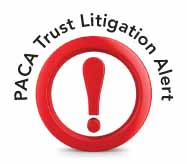
Neither the UCC nor the PACA recognize the term “Price After Sale“. The term is a subcategory of “Open Price.” A.P.S. Marketing, Inc. v. R.S. Hanline & Co., Inc., 59 Agric. 154 Dec. 407 (2000), Sucasa Produce v. A.P.S. Marketing, Inc., 59 Agric. Dec. 421 (2000), and Well Pict, Inc. v. Ag-West Growers, Inc., 39 Agric. Dec. 1221, 1227-1228 (1980).
See Eustis Fruit Co., Inc. v. The Auster Co., Inc., 51 Agric. Dec. 865 at 877 (1991) (“The term “price after sale” usually contemplates the parties agreeing to a price following the prompt resale of the produce. Such a sale is either f.o.b., delivered, or some variation thereof, in accordance with the agreement of the parties. If the parties do not specify f.o.b. or delivered then the Department assumes that the sale is f.o.b.”); Bonanza Farms, Inc. v. Tom Lange Co., Inc., 51 Agric. Dec. 839 at 846 (1991); M. Offutt Co., Inc. v. Caruso Produce, Inc., 49 Agric. Dec. 596 (1990).
Here is what you meant to say… “OPEN PRICE TERM”
UCC 2-305(1) defines an “Open Price Term” as follows:
(1) The parties, if they so intend, can conclude a contract for sale even though the price is not settled.
This first section means that a valid and enforceable contract may exist for the sale of goods even if the parties have not settled on an agreed price term. If the parties fail to agree upon a fixed price, the price will be set at a “reasonable price” and the question becomes: “what is a reasonable price?”
Under UCC 2-305(1), the price is a reasonable price at the time for delivery if:
(a) nothing is said as to price (i.e. no party timely objects); or
(b) the price is left to be agreed by the parties and they fail to agree; or
(c) the price is to be fixed in terms of some agreed market or other standard as set or recorded by a third person or agency and it is not so set or recorded.
Here are some examples of how the USDA deals with Open Price Term cases:
“Open Price” assumes parties will negotiate a price after the goods are sold. If they do not the reasonable value of the goods should be imputed. A.P.S. Marketing, Inc. v. R.S. Hanline & Co., Inc., 59 Agric. Dec. 407 (2000), and J. Macchiaroli Fruit Co. v. Ben Gatz Co., 38 Agric. Dec. 565 (1979). See also Anonymous, 5 Agric. Dec. 494 (1946).
The buyer cannot expect a seller to share in any losses which might be incurred in an open sale. Sharyland L.P. d/b/a Plantation Produce v. C.H. Robinson Company, 55 Agric. Dec. 1341 (1996). (emphasis added).
The term “open” is a generic term used to describe a SALE without a price being agreed to when the contract is first made. Other similar terms, which all fit under the generic term “open“ are:
-
“price after sale”
-
“price arrival”
-
“deferred billing”
-
“price after”
These terms should be examined with care because they do not all have the same meaning.
-
“price after sale” usually means that the parties will agree to a price after the buyer completes its resales at destination.
-
“price arrival” means that the parties will agree on a price when the goods arrive at destination after opportunity for inspection (see 7 C.F.R. 46.43 (cc)).
The terms “price after” and “deferred billing” are so vague that one must look solely to the context of the transaction and perhaps guess at what the parties intended. See Eustis Fruit Co., Inc. v. The Auster Co., Inc., 51 Agric. Dec. 865 at 877 (1991) (The term “price after sale” usually contemplates the parties agreeing to a price following the prompt resale of the produce. Such a sale is either f.o.b., delivered, or some variation thereof, in accordance with the agreement of the parties. If the parties do not specify f.o.b. or delivered then the Department assumes that the sale is f.o.b.). See also Bonanza Farms, Inc. v. Tom Lange Co., Inc., 51 Agric. Dec. 839 at 846 (1991); M. Offutt Co., Inc. v. Caruso Produce, Inc., 49 Agric. Dec. 596 (1990); Dennis Produce Sales, Inc. v. Caruso-Ciresi, Inc., 42 Agric. Dec. 178 (1983); Northwest Fruit Sales v. The Norinsberg Corporation, 39 Agric. Dec. 1556 (1980); and Slayman Fruit Co. v. Wholesale Produce Supply, Inc., 30 Agric. Dec. 1751 (1971).
TAKE AWAY…
The KEY point here is that WORD CHOICE matters. It is perfectly acceptable to use Open Terms on sales contracts, but clear and unambiguous language is needed. Buyers bear the risk here… Don’t accept questionable language about price terms from your suppliers. Vague terms should be deemed a red flag and steps should be taken as early as practicable to clarify the open terms.
A buyer’s failure to clearly define its open term contracts invites disputes about reasonable prices. To this end, the USDA will not make a seller share in any losses. So, if you have a deal to move distressed produce… the terms of that deal better be clear or the seller will assume all the risk. You know what they say, no good deed goes un-punished.






